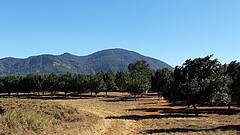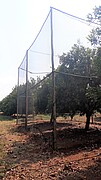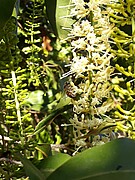Detail view
Animal teamwork: birds, bees and bats working together means more macadamia nuts [06.11.24]
International research team led by the universities of Göttingen and Hohenheim finds pollinators and predators promote profitable, sustainable farming
The interaction of bees, bats and birds has a decisive influence on the quantity and quality of macadamia nuts. This is the conclusion reached by an international research team led by the universities of Göttingen and Hohenheim. The effectiveness of animal ecosystem services - pollination and biological pest control- also depends on the altitude of the area and whether it provides natural habitats. The University of the Free State and the University of Venda in South Africa were also involved in this research. The results were published in Ecological Applications.
We used both observations and experiments to figure out how pollination and pest control – separately and together – affect plant production,” explains lead author Mina Anders from Göttingen University’s Functional Agrobiodiversity and Agroecology research group. The pollination by insects increased the number of nuts by as much as four times compared to plants which relied just on wind pollination, and this significantly boosted yields. At the same time, birds and bats that feed on insect pests reduced insect infestation by an average of 40 percent, thereby improving the overall quality of the nuts.
Professor Ingo Grass, Head of the University of Hohenheim’s Department of Tropical Agricultural Ecosystem Ecology, emphasises the importance of the composition of the landscape for improving these ecosystem services: “The benefits of pollination by insects were most noticeable in orchards where macadamia tree rows were oriented perpendicular to natural habitats. Meanwhile, the effectiveness of biological pest control decreased with elevation but was enhanced by the presence of nearby natural habitats.”
The research shows that pollination and biological pest control are essential and complementary ecosystem services, which can be optimised through smart plantation design and the protection of natural habitats. Catrin Westphal, Professor of Functional Agrobiodiversity and Agroecology at Göttingen University, emphasises the far-reaching implications of the study for sustainable agriculture: “By managing these ecosystem services together, we can transition to more sustainable agriculture. This will boost agricultural productivity while reducing the need for chemicals that endanger biodiversity.”
Original publication: Mina Anders et al. Complementary effects of pollination and biocontrol services enable ecological intensification in macadamia orchards. Ecological Applications 2024. DOI: 10.1002/eap.3049
Text: Universität Göttingen
Contact for press:
Prof. Dr. Ingo Grass, University of Hohenheim, Department of Ecology of Tropical Agricultural Systems
T +49 711 459 22385, ingo.grass@uni-hohenheim.de
Mina Anders, University of Göttingen; Faculty of Agricultural Sciences, Functional Agrobiodiversity and Agroecology Group,
T +49 (0)551 39-28265, E mina.anders@uni-goettingen.de
Back to






